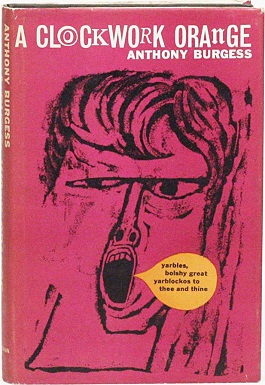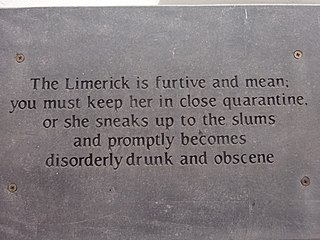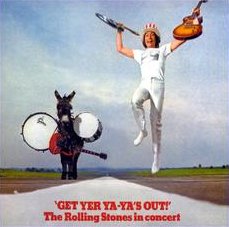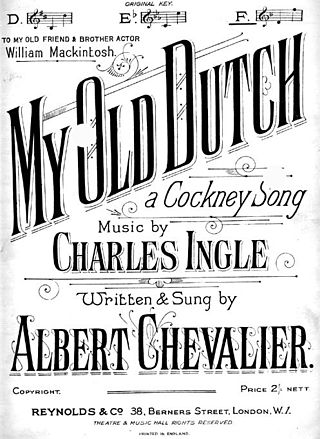
A Clockwork Orange is a dystopian satirical black comedy novella by English writer Anthony Burgess, published in 1962. It is set in a near-future society that has a youth subculture of extreme violence. The teenage protagonist, Alex, narrates his violent exploits and his experiences with state authorities intent on reforming him. The book is partially written in a Russian-influenced argot called "Nadsat", which takes its name from the Russian suffix that is equivalent to '-teen' in English. According to Burgess, the novel was a jeu d'esprit written in just three weeks.

Rhyming slang is a form of slang word construction in the English language. It is especially prevalent among Cockneys in England, and was first used in the early 19th century in the East End of London; hence its alternative name, Cockney rhyming slang. In the US, especially the criminal underworld of the West Coast between 1880 and 1920, rhyming slang has sometimes been known as Australian slang.
Cockney is a dialect of the English language, mainly spoken in London and its environs, particularly by Londoners with working-class and lower middle-class roots. The term Cockney is also used as a demonym for a person from the East End, or, traditionally, born within earshot of Bow Bells.

A limerick is a form of verse that appeared in England in the early years of the 18th century. In combination with a refrain, it forms a limerick song, a traditional humorous drinking song often with obscene verses. It is written in five-line, predominantly trimeter with a strict rhyme scheme of AABBA, in which the first, second and fifth line rhyme, while the third and fourth lines are shorter and share a different rhyme.

Kilroy was here is a meme that became popular during World War II, typically seen in graffiti. Its origin is debated, but the phrase and the distinctive accompanying doodle became associated with GIs in the 1940s: a bald-headed man with a prominent nose peeking over a wall with his fingers clutching the wall.
"Pop! Goes the Weasel" is a traditional English and American song, a country dance, nursery rhyme, and singing game that emerged in the mid-19th century. It is commonly used in Jack-in-the-box toys and for ice cream trucks.

Arthur Lloyd was a Scottish singer, songwriter, comedian and impresario. Lloyd was the first prolific and successful singer-songwriter for music hall in the United Kingdom. He wrote more than 1,000 songs, many of which were performed by himself and others. One of his compositions, Not for Joseph was the first comic song to sell more than 100,000 copies. He established his own theatre company, opened a theatre in London, performed for royalty and toured extensively, touring North America in 1893–94.

Get Yer Ya-Ya's Out!: The Rolling Stones in Concert is the second live album by the Rolling Stones, released on 4 September 1970 on Decca Records in the UK and on London Records in the United States. It was recorded in New York City and Baltimore in November 1969 prior to the release of Let It Bleed. It is the first live album to reach number 1 in the UK. It was reported to have been issued in response to the well-known bootleg Live'r Than You'll Ever Be. This was also the band's final release under the Decca record label and not under its own label Rolling Stones Records.
"Oh, Dem Golden Slippers" is a minstrel song penned by African-American James A. Bland in 1879, is particularly well known as a bluegrass instrumental standard. By 1880, the song had exceeded 100,000 copies sold.

"Brass in Pocket", also known as "Brass in Pocket (I'm Special)", is a song by English–American rock band the Pretenders, released in 1979 as the third single from their self-titled debut album. It was written by Chrissie Hynde and James Honeyman-Scott, and produced by Chris Thomas. Originating as a guitar lick written by Honeyman-Scott, the song's lyrics were explained by Hynde to be about the cockiness that one needs to effectively perform. The song's title derives from a phrase she overheard after a show.

"Bob's your uncle" is a phrase commonly used in the United Kingdom and Commonwealth countries that means "and there it is", or "and there you have it", or "it's done". Typically, someone says it to conclude a set of simple instructions or when a result is reached. The meaning is similar to that of the French expression "et voilà!".

Moke is a term used in the British Isles as slang for "donkey". In Australia it refers to a nag or inferior horse, and is employed by residents of the Hawaiian Islands in similar fashion as the British to derogatorily describe segments of the local Polynesian population. In practice, the word "moke" is similar to "redneck", as it is only used to describe a certain personality type, instead of an entire ethnic group.
Fruit, fruity, and fruitcake, as well as its many variations, are slang or even sexual slang terms which have various origins. These terms have often been used derogatorily to refer to LGBT people. Usually used as pejoratives, the terms have also been re-appropriated as insider terms of endearment within LGBT communities. Many modern pop culture references within the gay nightlife like "Fruit Machine" and "Fruit Packers" have been appropriated for reclaiming usage, similar to queer.
British slang is English-language slang originating from and used in the United Kingdom and also used to a limited extent in Anglophone countries such as India, Malaysia, Ireland, South Africa, Australia, Canada, and New Zealand, especially by British expatriates. It is also used in the United States to a limited extent. Slang is informal language sometimes peculiar to a particular social class or group and its use in Britain dates back to before the 15th century. The language of slang, in common with the English language, is changing all the time; new words and phrases are being added and some are used so frequently by so many, they almost become mainstream.

Harry Rickards, born Henry Benjamin Leete, was an English-born baritone, comedian and theatre owner, most active in vaudeville and stage, first in his native England and then Australia after emigrating in 1871.
A subverted rhyme, teasing rhyme or mind rhyme is the suggestion of a rhyme which is left unsaid and must be inferred by the listener. A rhyme may be subverted either by stopping short, or by replacing the expected word with another. Teasing rhyme is a form of innuendo, where the unsaid word is taboo or completes a sentence indelicately.

"My Old Dutch" is an 1892 music hall and vaudeville song performed by Albert Chevalier. The lyrics were written by Chevalier, with music composed by his brother Auguste under the name Charles Ingle. Described as one of Chevalier's most popular works, the song was possibly written as a tribute to Chevalier's wife Florrie.

"Nice One Cyril" is a single by Cockerel Chorus written by Harold Spiro and Helen Clarke. The song title is a reference to Cyril Knowles, a left back who played for Tottenham Hotspur. It was released before the 1973 Football League Cup Final where Tottenham played Norwich City. It reached No. 14 on the UK Singles Chart, after Tottenham won, and its writers Spiro and Clarke received an Ivor Novello Award for Best Novel or Unusual Song in 1974.
"Old soldiers never die" is an English language catchphrase, with the full version being "Old soldiers never die, they simply fade away". It is made from a stanza from the soldiers' folklore song Old Soldiers Never Die:

"Let's All Go Down the Strand" is a popular British music hall song of the late 19th and early 20th centuries, written by Harry Castling and C. W. Murphy. It was first performed by Castling, and was published in 1909. It was inspired by the Strand, a street in Westminster, Central London, that in the late 19th century became a centre for theatres, hotels and music halls. The song has three verses describing people trying to persuade others to abandon their current plans to "go down the Strand". The first verse is about a group of tourists planning a trip to Germany, the second about prisoners in jail and the third about sailors returning with Ernest Shackleton from a polar expedition. The song was popular with British soldiers in the First World War. A refrain of "have a banana", not included in the published lyrics, was often interposed after the first line of the chorus. Sometimes "Gertie Gitana" was sung instead, leading to the use of "Gertie" as rhyming slang for the fruit. A version was released by rock band Blur in 1993.














